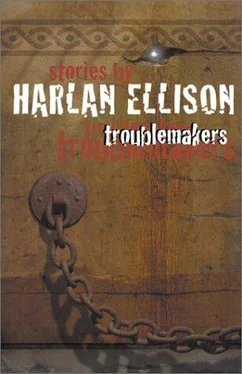The lesson in this “space opera” should be apparent. If you’re hired to do a job, DO THE DAMNED JOB! There are always punk-out reasons you can dream up why: “I’m not being paid enough” or “They work me too hard” or “How come s/he over there is doing the same job as I am, but s/he’s getting paid twice as much” or “They don’t respect me.” You’re supposed to enjoy the work you do, but if circumstances put you in the grease at a Mickey D’s, or under a leaking tranny on somebody’s Yugo, or working the stockroom at a K-Mart or Target, and you have to do it for the dough, and you hate the job, and you hate the hours, and you hate the fact that you can’t be out hanging with the posse, well tough sh-t, Joker; you signed on to do the job, and they pay you to do it, so DO THE DAMNED JOB! If you don’t like the gig, quit. Give ‘em notice promptly, don’t leave ‘em in the lurch suddenly, don’t trash the area out of baby-spite, and don’t start shoplifting. Just DO THE DAMN JOB! That’s how somebody with strength does it. Don’t whine, don’t piss’n’moan, don’t jerk ‘em around, just hang in there as long as it’s ethically necessary, and then get in the wind. But if you sign on to do the job, no matter how onerous the chore, DO THE DAMNED JOB, just do it.
Darkness seeped in around the little Quonset. It oozed out of the deeps of space and swirled around Ferreno’s home. The automatic scanners turned and turned, whispering quietly, their message of wariness unconsciously reassuring the old man.
He bent over and plucked momentarily at a bit of lint on the carpet. It was the only speck of foreign matter on the rug, reflecting the old man’s perpetual cleanliness and almost fanatical neatness.
The racks of book spools were all binding-to-binding, set flush with the lips of the shelves; the bed was made with a military tightness that allowed a coin to bounce high three times; the walls were free of fingerprints-dusted and wiped clean twice a day; there was no speck of lint or dust on anything in the one-room Quonset.
When Ferreno had flicked the single bit of matter from his fingers, into the incinerator, the place was immaculate.
It reflected twenty-four years of watching, waiting, and living alone. Living alone on the edge of Forever, waiting for something that might never come. Tending blind, dumb machines that could say Something is out here, but also said, We don’t know what it is.
Ferreno returned to his pneumo-chair, sank heavily into it, and blinked, his deep-set gray eyes seeking into the farthest rounded corner of the Quonset’s ceiling. His eyes seemed to be looking for something. But there was nothing there he did not already know. Far too well.
He had been on this asteroid, this spot lost in the darkness, for twenty-four years. In that time, nothing had happened.
There had been no warmth, no women, no feeling, and only a brief flurry of emotion for almost twenty of those twenty-four years.
Ferreno had been a young man when they had set him down on The Stone. They had pointed out there and said to him:
“Beyond the farthest spot you can see, there’s an island universe. In that island universe there’s an enemy, Ferreno. One day he’ll become tired of his home and come after yours.
“You’re here to watch for him.”
And they had gone before he could ask them.
Ask them: who were the enemy? Where would they come from, and why was he here, alone, to stop them? What could he do if they came? What were the huge, silent machines that bulked monstrous behind the little Quonset? Would he ever go home again?
All he had known was the intricate dialing process for the inverspace communicators. The tricky-fingered method of sending a coded response half across the galaxy to a waiting Mark LXXXII brain-waiting only for his frantic pulsations.
He had known only that. The dialing process and the fact that he was to watch. Watch for he-knew-not-what!
There at first he had thought he would go out of his mind. It had been the monotony. Monotony intensified to a frightening degree. The ordeal of watching, watching, watching. Sleeping, eating from the self-replenishing supply of protofoods in the greentank, reading, sleeping again, rereading the book spools tin their casings crackled, snapped, and lost panes. Then the rebinding-and re-rereading. The horror of knowing every passage of a book by heart.
He could recite from Stendhal’s Le Rouge et le Noir and Hemingway’s Death In The Afternoon and Melville’s Moby Dick, till the very words lost meaning, sounded strange and unbelievable in his ears.
First had come living in filth and throwing things against the curving walls and ceilings. Things designed to give, and bounce-but not to break. Walls designed to absorb the impact of a thrown drink-ball or a smashing fist. Then had come the extreme neatness, then a moderation, and finally back to the neat, prissy fastidiousness of an old man who wants to know where everything is at any moment.
No women. That had been a persistent horror for the longest time. A mounting pain in his groin and belly that had wakened him during the arbitrary night, swimming in his own sweat, his mouth and body aching. He had gotten over it slowly. He had even attempted emasculation. None of it had worked, of course, and it had only passed away when his youth had passed away.
He had taken to talking to himself. And answering himself. Not madness, just the fear that the ability to speak might be lost.
Madness had descended many times during the early years. The blind, clawing urgency to get out! Get out into the airless vastness of The Stone. At least to die, to end this nowhere existence.
But they had constructed the Quonset without a door. The plasteel-sealed slit his deliverers had used as an exit, had been closed irrevocably behind them, and there was no way out.
Madness had come often.
But they had selected him wisely. He clung to his sanity; he knew it was his only escape. He knew it would be a far more horrible thing to end out his days in this Quonset a helpless maniac, than to remain sane.
He swung back over the line and soon grew content with his world in a shell. He waited, for there was nothing else he could do; and in his waiting a contentment grew out of frantic restlessness. He began to think of it as a jail, then as a coffin, then as the ultimate black of the Final Hole. He would wake in the arbitrary night, choking, his throat constricted, his hands warped into claws that scrabbled at the foam rubber of the sleeping couch with fierceness.
The time was spent. A moment after it had passed, he could not tell how it had been spent. His life became dust-dry and at times he could hardly tell he was living. Had it not been for the sealed, automatic calendar, he would hardly have known the years were passing.
And ever, ever, ever-the huge, dull, sleeping eye of the warning buzzer. Staring back at him, veiled, from the ceiling.
It was hooked up with the scanners. The scanners that hulked behind the Quonset. The scanners in turn were hooked up to the net of tight inverspace rays that interlocked each other out to the farthest horizon Ferreno might ever know.
And the net, in turn, joined at stop-gap junctions with the doggie-guards, also waiting, watching with dumb metal and plastic minds for that implacable alien enemy that might someday come.
They had known the enemy would come, for they had found the remnants of those the enemy had destroyed. Remnants of magnificent and powerful cultures, ground to microscopic dust by the heel of a terrifying invader.
They could not chance roaming the universe with those Others somewhere. Somewhere...waiting. They had formed the inverspace net, joining it with the doggie-guards. And they had hooked the system in with the scanners; and they had wired the scanners to the big, dull eye in the ceiling of the Quonset.
Читать дальше












